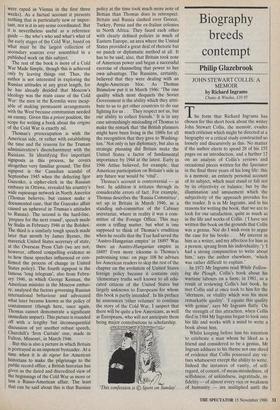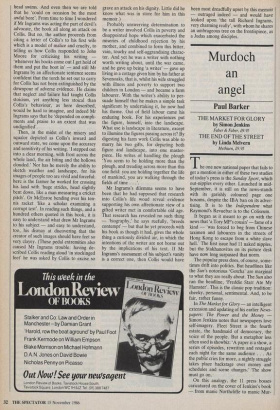Biography breeds contempt
Philip Glazebrook
JOHN STEWART COLLIS: A MEMOIR by Richard Ingrams
Chatty & Windus, £10.95
The form that Richard Ingrams has chosen for this short book about the writer John Stewart Collis, the memoir, evades much criticism which might be directed at a biography or a critical study constructed so loosely and discursively as this. No matter if the author elects to spend 28 of his 155 pages on an introduction, and a further 12 on an analysis of Collis's reviews and occasional pieces written for the Spectator in the final three years of his long life: this is a memoir, an entirely personal account of its subject, which must stand or fall not by its objectivity or balance, but by the illumination and amusement which the subjectivity of the approach provides for the reader. It is in Mr Ingrams, and in his reasons for writing the book, that we are to look for our satisfaction, quite as much as in the life and works of Collis. CI have not written this book on the grounds that Collis was a genius. Nor do I wish even to argue the case for his books . . . My interest in him as a writer, and my affection for him as a person, sprang from his individuality.') 'I had a strong compunction to write about him,' says the author elsewhere, 'which was rather difficult to explain.'
In 1971 Mr Ingrams read While Follow- ing the Plough, Collis's book about his wartime labours on a farm; in 1981, as a result of reviewing Collis's last book, he met Collis and at once took to him for the `alertness, or vitality which was his most remarkable quality'. 'I equate this quality with genius', says Mr Ingrams flatly. On the strength of this attraction, when Collis died in 1984 Mr Ingrams began to look into his life and works with a mind to write a book about him.
Whilst keeping before him his intention to celebrate a man whom he liked as a friend and considered to be a genius, Mr Ingram adduces to his theme not one shred of evidence that Collis possessed any vir- tues whatsoever except the ability to write. Indeed the instances of vanity, of self- regard, of conceit, of mean-mindedness, of selfishness, of unkindness, ingratitude, in- fidelity — of almost every vice or weakness of humanity — are multiplied until the head swims. And even then we are told that he 'could on occasion be the most awful bore'. From time to time I wondered if Mr Ingrams was acting the part of devil's advocate, the book all along an attack on Collis. But no, the author proceeds from citing a letter of Collis's to his first wife which is a model of malice and cruelty, to telling us how Collis responded to John Moore for criticising his writing 'whenever his books come out I get hold of them and put the boot in' — and still Mr Ingrams by an affectionate sentence seems confident that the torch he set out to carry for Collis has not been extinguished by the downpour of adverse evidence. He claims that neglect and failure had taught Collis stoicism, yet anything less stoical than Collis's behaviour, as here described, would be hard to imagine, and indeed Mr Ingrams says that he 'depended on compli- ments and praise to an extent that was undignified'.
Then, in the midst of the misery and squalor depicted as Collis's inward and outward state, we come upon the accuracy and sensitivity of his writing. 'I stepped out into a clear morning, with frost across the whole land, the air biting and the hollows clouded.' Nor has he merely the ability to sketch weather and landscape, for his images of people too are vivid and forceful: here is the farmer he worked for crossing his land with 'huge strides, head slightly bent down, like a man measuring a cricket pitch'. Or McEnroe bending over his ten- nis racket 'like a scholar examining a corrupt text'. In reading such things, and a hundred others quoted in this book, it is easy to understand what drew Mr Ingrams to his subject — and easy to understand, too, his dismay at discovering that the creator of such images should have feet so very clayey. (These pedal extremities also caused Mr Ingrams trouble: having de- scribed Collis reading aloud 'in stockinged feet' he was asked by Collis to excise so grave an attack on his dignity. Little did he know what was in store for him in this memoir.) Probably unswerving determination to be a writer involved Collis in poverty and disappointed hope which exacerbated the miseries of childhood rejection by his mother, and combined to form this bitter, vain, touchy and self-aggrandising charac- ter. And yet he was a writer with nothing worth writing about, until the war came, and he gave up being 'a writer' — gave up living in a cottage given him by his father at Sevenoaks, that is, whilst his wife struggled with illness and poverty to support two children in London — and became a farm labourer. With the writer's ability to per- suade himself that he makes a simple task significant by undertaking it, he now had his theme. Out of field labour came his enduring book. For his experiences put the figure, himself, into the landscape. What use is landscape in literature, except to illumine the figures passing across it? By digesting his farm work Collis was able to marry his two gifts, for depicting both figure and landscape, into one master- piece. He writes of handling the plough `You seem to be holding more than thp plough, and treading across more than this one field: you are holding together the life of mankind, you are walking through the fields of time . .
Mr Ingrams's dilemma seems to have been that he had supposed that research into Collis's life woud reveal evidence supporting his own affectionate view of a gifted writer met in comfortable old age. That research has revealed no such thing — 'biography,' he says ruefully, 'breeds contempt' — but that he yet proceeds with his book as though it had, gives the whole thing a curiously divided air, in which the intentions of the writer are not borne out by the implications of his text. If Mr Ingrams's assessment of his subject's vanity is a correct one, then Collis would have been most dreadfully upset by this memoir — outraged indeed — and would have looked upon 'the tall Richard Ingrams, very charming really', with whom he shares an umbrageous tree on the frontispiece, as a Judas among disciples.



































































 Previous page
Previous page